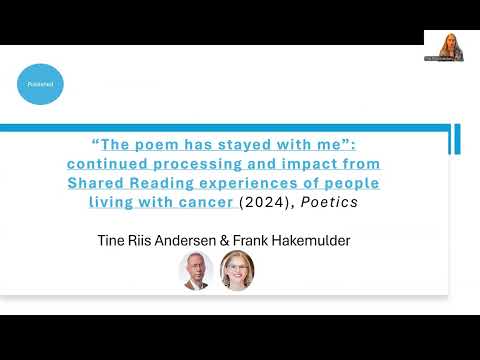 Speaker: Tine Riis Andersen @tineriis
Speaker: Tine Riis Andersen @tineriis
 Affiliation: The Norwegian Centre for Reading Education and Research, University of Stavanger, Norway & Faculty of Education, University of Trnava, Slovakia
Affiliation: The Norwegian Centre for Reading Education and Research, University of Stavanger, Norway & Faculty of Education, University of Trnava, Slovakia
Title: Resonances and Echoes: How to Investigate Continued Processing and Impact of Shared Reading Experiences
Abstract (long version below): This symposium is focused on the topic of Shared Reading. It showcases different empirical methods - both quantitative and qualitative - that can be used to investigate the effects of Shared Reading or look at how Shared Reading can be incorporated into research designs within empirical literary studies. We hope to inspire a discussion on the different choices of experiment designs: measures, stimulus materials, observation methods, as well as analytical approaches (coding schemes, statistical tests, etc.). The possibilities of using Shared Reading as a method for data collection will also be discussed.

 Long abstract
Long abstract
Dixon and Bortolussi (2015) argue that the approach to studying reading experiences has been limited to effects during or right after reading and not covering memories of these encounters: “[a literary text] may linger and continue to generate reactions even though it is not physically present” (2015, p. 178). Thus, they encourage researchers to study reading experiences as an ongoing process rather than a predetermined outcome. This conference presentation will examine and discuss methodologies to investigate the continued, delayed and possible long-term impact and processing of (shared) reading experiences. Much work has been done on Shared Reading (SR) regarding how readers engage and experience literary texts during a session (Davis et al., 2016; Dowrick et al., 2012; Longden et al., 2015). However, research is sparse on what happens after a session when the participants have packed away the texts (a prose text and a poem) and returned to their homes: How may the texts that were read and discussed ‘stay’ with them? Investigations of the long-term impact of SR experiences are needed to shed light on the personal significance of reading experiences and how this might exceed the limited time participants spend together during sessions. In this presentation, I will present our methodology and insights from a qualitative multiple case study exploring how ‘resonances and echoes’ from SR experiences helped people living with cancer cope with their illness (Andersen & Hakemulder, 2024) and how their reading experiences helped cope with their illness. With this presentation, I wish to discuss research methodologies that connect the reading experience during the session (the resonances) to the memories (the echoes) of it by mapping those relations. I aim to show that retrospective data can have a separate value in learning more about how we process literary texts in the time after the reading.
References
Andersen, T. R., & Hakemulder, F. (2024). “The poem has stayed with me”: Continued processing and impact from Shared Reading experiences of people living with cancer. Poetics, 102, 101847. Redirecting
Davis, P., Magee, F., Koleva, K., Tangerås, T. M., Hill, E., Baker, H., & Crane, L. (2016). What Literature Can Do. University of Liverpool.
Dixon, P., & Bortolussi, M. (2011). The scientific study of literature: What can, has, and should be done. Scientific Study of Literature, 1(1), 59–71. The scientific study of literature: What can, has, and should be done | John Benjamins
Dixon, P., & Bortolussi, M. (2015). Measuring literary experience: Comment on Jacobs (2016). Scientific Study of Literature, 5(2), 178–182. Measuring literary experience | John Benjamins
Dowrick, C., Billington, J., Robinson, J., Hamer, A., & Williams, C. (2012). Get into Reading as an intervention for common mental health problems: Exploring catalysts for change. Medical Humanities, 38(1), 15–20. https://doi.org/10.1136/medhum-2011-010083
Longden, E., Davis, P., Billington, J., Lampropoulou, S., Farrington, G., Magee, F., Walsh, E., & Corcoran, R. (2015). Shared Reading: Assessing the intrinsic value of a literature-based health intervention. Medical humanities, 41. https://doi.org/10.1136/medhum-2015-010704

